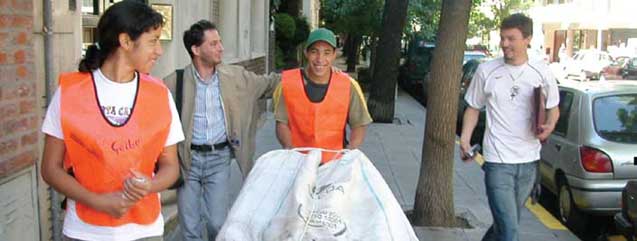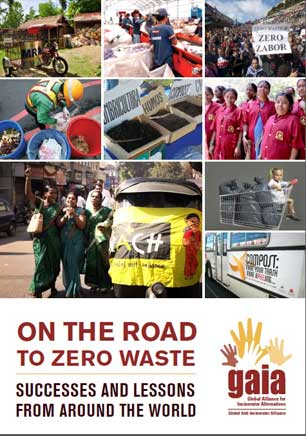
This week Other Worlds launches the blog series “Environmental Possibilities: Zero Waste,” featuring new ways of thinking, acting, and shaping government policy. Each week, we highlight a success story in the zero waste movement, excerpted from the report On the Road to Zero Waste: Successes and Lessons from Around the World by the Global Alliance for Incinerator Alternatives (GAIA). GAIA is a powerful worldwide alliance of more than 650 grassroots groups, non-governmental organizations, and individuals in over 90 countries. Their collective goal is a just, toxic-free world without incineration. Other Worlds is excited to promote the work of GAIA and the organized communities it works with, and hopes that the stories inspire you and others to begin moving your home, town or city, nation, and planet toward zero waste. This introduction to zero waste is the first in a ten-part series on zero waste successes and lessons. The following weeks will feature inspiring stories about zero waste achievements in San Francisco and waste pickers in India, to be followed by additional stories from around the globe.
***
Zero waste is both a goal and a plan of action. The goal is to protect and recover scarce natural resources by ending waste disposal in incinerators, dumps, and landfills. The plan encompasses waste reduction, composting, recycling and reuse, changes in consumption habits, and industrial redesign. The premise is that if a product cannot be reused, composted, or recycled, it just should not be produced in the first place.
 Just as importantly, zero waste is a revolution in the relationship between waste and people. It is a new way of thinking about safeguarding the health and improving the lives of everyone who produces, handles, works with, or is affected by waste—in other words, all of us.
Just as importantly, zero waste is a revolution in the relationship between waste and people. It is a new way of thinking about safeguarding the health and improving the lives of everyone who produces, handles, works with, or is affected by waste—in other words, all of us.
Zero waste strategies help societies to produce and consume goods while respecting ecological limits and the rights of communities. The strategies ensure that all discarded materials are safely and sustainably returned to nature or to manufacturing in place of raw materials. In a zero waste approach, waste management is not left only to politicians and technical experts; rather, everyone impacted—from residents of wealthy neighborhoods to the public, private, and informal sector workers who handle waste—has a voice.
Practicing zero waste means moving toward a world in which all materials are used to their utmost potential, in a system that simultaneously prioritizes the needs of workers, communities, and the environment. It is much like establishing zero defect goals for manufacturing, or zero injury goals in the workplace.
Zero waste is ambitious, but it is not impossible. Nor is it part of some far-off future. Today, in small towns and big cities, in areas rich and poor, in the global North and South, innovative communities are making real progress toward the goal of zero waste. Every community is different, so no two zero waste programs are identical, but the various approaches are together creating something bigger than the sum of their parts: protection of the earth and the natural riches which lie under, on, and over it. Here are a few examples of what is working:
* Through incentives and extensive public outreach, San Francisco has reduced its waste to landfill by 77 percent—the highest diversion rate in the United States—and is on track to reach 90 percent by 2020;
* A door-to-door collection service operated by a cooperative of almost 2,000 grassroots recyclers in Pune, India—now part of the city’s waste management system—diverts enough waste to avoid 640,000 tons of greenhouse gas emissions annually;
* Aggressive standards and incentives for both individuals and businesses in the Flanders region of Belgium have achieved 73 percent diversion of residential waste, the highest regional rate in Europe;
* In Taiwan, community opposition to incineration pushed the government to adopt goals and programs for waste prevention and recycling. The programs were so successful that the quantity of waste decreased significantly, even as the population increased and the economy grew;
* An anti-incinerator movement in the Spanish province of Gipuzkoa led to the adoption of door-to-door waste collection services in several small cities, which have since reduced the amount of waste going to landfills by 80 percent;
* In the Philippines, a participatory, bottom-up approach has proven that communities have the ability to solve their own waste management problems;
* A focus on organics in Mumbai, India and La Pintana, Chile has produced real value from the cities’ largest and most problematic portion of municipal waste;
* In Buenos Aires, Argentina, grassroots recyclers focused on cooperatives and took collective political action. As a result, the city began separating waste at the source, an essential step toward its goal of 75 percent diversion by 2017.
While few locations are bringing together all the elements of a comprehensive zero waste plan, many have in common a philosophy driven by four core strategies:
1. Moving away from waste disposal: Zero waste moves societies away from waste disposal by setting goals and target dates to reduce waste going to landfills, abolishing waste incineration, establishing or raising landfill fees, shifting subsidies away from waste disposal, banning disposable products, and other actions. Government policies which promote these interventions are strongest when they incentivize community participation and incorporate the interests of waste workers.
2. Supporting comprehensive reuse, recycling, and organics treatment programs: Zero waste is about creating a closed cycle for all the materials we use—paper, glass, metals, plastic, and food among them. Such a system operates through separating waste at its source in order to reuse, repair, and recycle inorganic materials, and compost or digest organic materials. Separate organics collection ensures a stream of clean, high-quality material which in turn enables the creation of useful products (compost and biogas) from the largest portion of municipal waste.
3. Engaging Communities: Zero waste relies on democracy and strong community action in shaping waste management. A lengthy initial consultation process can pay off with better design and higher participation rates. Residents must actively participate in the programs by consuming sustainably, minimizing waste, separating discards, and composting at home.
A successful zero waste program must also be an inclusive one. Inclusive zero waste systems make sure that resource recovery programs include and respect all those involved in resource conservation, especially informal recyclers whose livelihoods depend on discarded materials. The workers who handle waste should be fully integrated into the design, implementation, and monitoring processes, as they ultimately make the system function. In some communities, where waste workers come from historically excluded populations, this may require ending long-standing discriminatory practices.
4. Designing for the future: Zero waste emphasizes efficient use of resources; safe manufacturing and recycling processes to protect workers; product durability; and design for disassembly, repair, and recycling. Once communities begin to put zero waste practices in place, the residual fraction—that which is left over because it is either too toxic to be safely recycled or is made out of non-recyclable materials—becomes evident, and industrial design mistakes and inefficiencies can be studied and corrected.
Reducing or substituting toxic materials, reducing packaging, and environmentally preferable purchasing are some important strategies.
Each of the communities discussed in these case studies is enjoying significant environmental, climatic, social, economic, and sanitation benefits as a result of its moves to zero waste. Together, the successes offer models we can all build from, regardless of context. Let us all learn what is environmentally possible, and begin turning the possibilities into reality.
Matching Opportunity Extended: Please support Truthout today!
Our end-of-year fundraiser is over, but our donation matching opportunity has been extended! Today, all donations to Truthout will be matched dollar for dollar. Your one-time gift today will be matched immediately. As well, your monthly donation will be matched for the whole first year, doubling your impact.
This matching gift comes at a critical time. Trump has made it no secret that he is planning a demolition-style attack on both specific communities and democracy as a whole, beginning on his first day in office.
Help us prepare for Trump’s Day One, and have your donation matched today!